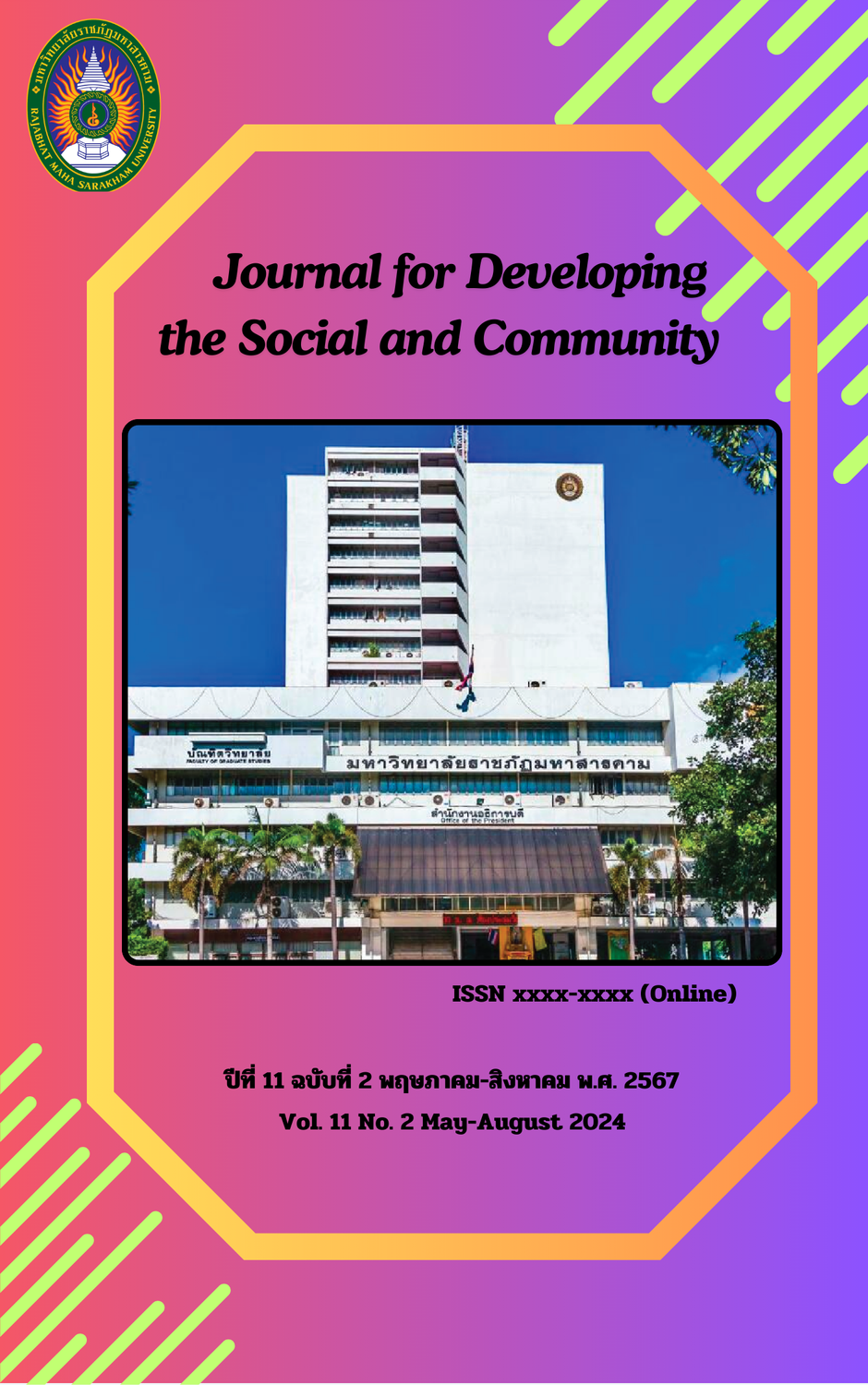A study of Confidence and Mathematical Problem Solving for grade eight students
Keywords:
Confidence, Mathematical problem solvingAbstract
The purposes of this study were to (1) study the confidence of eighth grade students, (2) study the mathematical problem solving of eighth grade students, (3) study the relation between the self-confidence and Mathematical problems solving for eighth grade students. With a purposive sampling, purposive sampling were 83 students from the eighth grade class had two classes was 2/6 and 2/8, Sarakham Pittayakhom School, Mueang Maha Sarakham, Maha Sarakham province, Under the jurisdiction of the Secondary Educational Service Area Office 26. Research tools were a confidence test, a mathematical problem solving test, and an interview form of solving mathematical problems. Statistics for research were percentage, average, standard deviation, pearson correlation coefficient and a case study method. Data were presented through descriptive analytics.
The results of the study were as follow: (1) the confidence level of most eighth grade students was at a moderate level, representing 66.26 percent, followed by a low level, it is 20.49 percent and is at a high level, represented as 13.25 percent (2) The mathematical problem solving of the eighth grade students mostly at mathematical problem solving is in fairly level, representing 49.40 percent, and (3) The relation between confidence and mathematical problem solving is a high level. With a correlation coefficient of .855 and from a study of the concept of finding answers among students with different levels of self-confidence. It was found that students at a high level Be confident in answering questions Problems are solved in a sequential and logical manner. Can explain thinking and problem solving. Students who are in the middle level Have some confidence in answering questions. And it cannot explain thinking and problem solving. But students are unable to solve complex problems. and students at a low-level Lack of confidence in answering questions There is no sequential and logical solution to the problem. Some people cannot explain their thinking and problem solving. Some people know how to solve problems but cannot use their thinking skills.
References
Chantarasonthi, U. (2013). Mathematical content and knowledge. Nonthaburi:
Sukhothai Thammathirat Open University.
Department of Academic Affairs. (2002). Learning management manual for mathematics subject group. (3rded). Bangkok: Ministry of Education.
Hogan, M and Alejandre, S. (2010). Problem Solving-It Has to Begin with Noticing and Wondering. CMC ComMuniCator, 35(2), 31-33.
Hongphan, T. (1996). The way of the graduate: owning one's own people and holding one's job. Nakhon Ratchasima: Somboon Offset Printing.
Institute for the Promotion of Teaching Science and Technology. (2007). Mathematics skills/processes. Bangkok: Teacher Printing House Ladprao.
Institute for the Promotion of Teaching Science and Technology. (2008). Examples of science evaluations International: PISA and TIMSS. Bangkok: Arun Publishing.
Institute for the Promotion of Teaching Science and Technology. (2012). Skills and Process Mathematically. Bangkok: 3-Q Media.
Krulik, S. and Reys, R. E. (1980). Problem Solving in School Mathematics: National Council of Teacher of Mathematics 1980 Year Book. Reston, VA: National Council of Teacher of Mathematics.
Krulik, S. and Rudnick, J. A. (1992). Reasoning and Problem - Solving. A Handbook for Elementary School Teachers. Boston: Allyn and Bacon.
Kuptabjian, R. (1985). "Self-confidence". Khon Kaen: Khon Kaen University.
Makanong, A. (2011). Mathematics skills and processes: development for development. Bangkok: Chulalongkorn University.
Piyaacchariya, L. (1999). Development of children's self-confidence. Bangkok: Sukhothai
Thammathirat Open University.
Polya, G. (1985). How to solve it 2nd ed. New Jersey: Princeton University Press.
Smith, H. C. (1961). Personality adjustment. New York: McGraw-Hill.
Thammasin, V. (1984). Creating a personality test for self-confidence for Mathayom 3 students, Chiang Mai Province. Bangkok: Srinakharinwirot University Prasarnmit.
Wiangkamol, Y. (1998). Results of self-assessment using portfolios on self-confidence of Grade 6 students with low academic achievement. Master’s thesis : Primary Education Department Graduate School Chulalongkorn University.
Downloads
Published
How to Cite
Issue
Section
License
Copyright (c) 2024 Journal for Developing the Social and Community

This work is licensed under a Creative Commons Attribution-NonCommercial-NoDerivatives 4.0 International License.
Articles that are published are copyrighted by the authors of the articles







